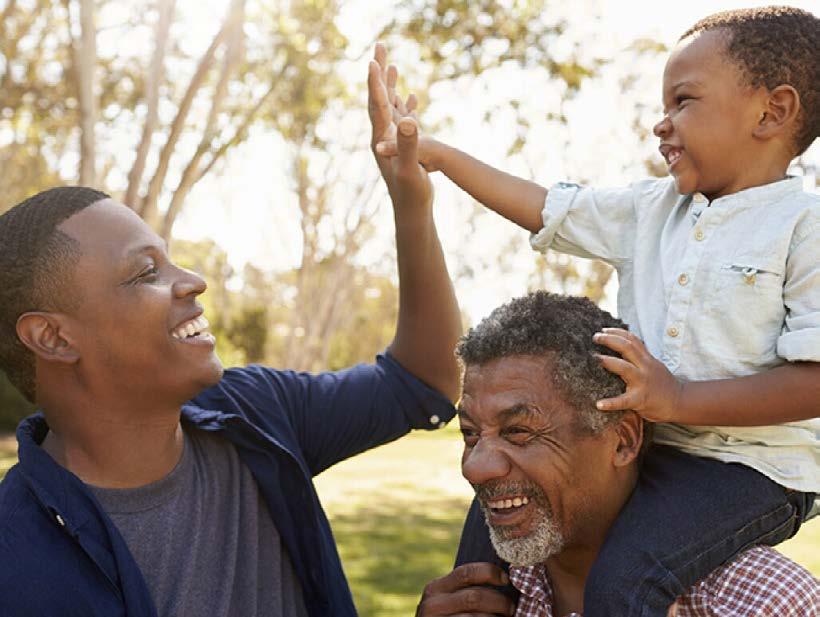Trevor Noah disembarks





public reaction to Min ister of Finance Enoch Godong wana’s charges of sexual assault withdrawal came with a worrying silence.
The muzzle could make for a suspi cious reception.
Nkebe Kanyane, of the Mpumalanga directorate of public prosecutions an nounced in September that the State declined to prosecute the minister. This because of “a thorough assessment” of the evidence as well as consideration of the complainant’s refusal to proceed with the case, “despite the State’s offer of support”.

It is this “support” for sexual assault victims that could be the source of mis givings.
The South African criminal justice system is fraught with erroneous deci sions where sexual assault cases are concerned. Police are poorly equipped to effectively handle cases of sexual assault; from rape kits, forensic evi dence collection to the apprehending of suspects. This extends right up to the prosecution.
For this reason, when one hears that a victim withdrew charges, there is an obvious course for concern. There is a high number of victims who withdraw cases. This, oftentimes, has nothing to do with the victim’s decision, but rather the expertise or rather lack thereof by the criminal justice.
What’s more, in this case, the alleged perpetrator is such a powerful figure. Scepticism just sky rockets.
Such doubts are disastrous to the fight against sexual assault. They are in the same basket as those who cry wolf. When a person is wrongfully accused or convicted of a sexual assault offense, which rolls the fight against the scourge a million times back. It even betrays victims many times.
Sadly, we have seen many of these unfortunate situations recently. Some of the stories are so sad, it boggles the mind why nothing is being done.
In 2004, 19-year-old Njabulo Ndlovu of Umlazi in Durban, KwaZulu-Natal, was sentenced to life imprisonment. He was to be exonerated by DNA evidence in 2018 having spent 14 years in jail, aged 35. At the time of his arrest, he was studying for his second year for a law de gree at the University of KwaZulu-Natal.
Last year, in August, a teacher, who spent more than a year in custody after being falsely accused of raping a child, was awarded more than R1.6m in dam ages.
In his civil case against the minister of police and the national director of public prosecutions, Patrick Buthelezi set out
in graphic detail the experiences he en countered while incarcerated - not least of which was his terror that his fellow inmates would discover he was the one accused of raping a nine-year-old.
This after a newspaper article found its way into his cell and was read aloud. It gave details of the case but did not men tion him by name.
Comedian Toll Ass Mo, whose real name is Mongezi Mahlangu, and his wife Mome have lost a fortune in lost work opportunities. They even had to relocate from their home in Sandton since charg es of sexual assault were laid against Tol Ass Mo in 2020.
This was revealed by Toll Ass Mo’s forensic polygraph investigator Antoi nette Coetzer after the former star of the reality TV show Mo & Mome was acquitted of charges of rape and sexual harass ment in the Paarl Regional Court.
In another incident, although this specific matter did not go to trial, false accusation ruined a person’s life. It involves TV presenter Katlego Maboe and ex-partner Monique Muller who straddled Maboe on the social media for alleged infidelity and abuse. The courts later absolved him of alleged miscon duct.
Of course, most allegations of do mestic and sexual violence are made in good faith and false allegations are rare. But the damage that comes with it is huge.
Experts worry about the framing of these things.
“One key problem in assessing the extent of false allegations is that some studies do not define what a false al legation is, and some law enforcement records rely on ambiguous or overly inclusive definitions.
“One common confusion is between ‘unfounded’ and false cases. Unfounded or unsubstantiated cases are the ones in which there is a ‘not guilty’ verdict. Genuinely, false cases are a subset of these, and involve a deliberately false allegation or report,” an expert said.
We may never know which one of these subsets of the Godongwana mat ter are lies, unfounded or false. From where I stand, it doesn’t matter.
Irrespective who may ultimately take the blame, it shouldn’t happen.
Society, government in particular, must take rape and sexual assault seri ously, especially once the matter gets into the criminal justice system process. The process must be carried out with un sullied care and every correct effort must be made for justice to be served.
Rape is way too serious to be left to chance.
Afterseven years behind the latenight desk, Trevor Noah is leaving The Daily Show. Trevor shared his intended departure on Thursday 29 September during the show, saying, “I feel like it’s time.”
The South African comedian was relative ly unknown in the US before being tapped to replace longtime Daily Show host Jon Stewart in 2015, a choice that Noah called “a crazy bet to make” during his remarks.
He went on to express his gratitude for having been chosen to man The Daily Show desk, reflecting on his tenure on the show. “I found myself thinking throughout the time, you know, everything we’ve gone through: the Trump presidency, the pandemic, just the journey of, you know…the more pandemic. And I realised that after the seven years, my time is up, but in the most beautiful way, honestly,” said Noah, eliciting audible gasps from the audience.
He continued: “I’ve loved hosting this show. It’s been one of my greatest chal lenges. It’s been one of my greatest joys. I’ve loved trying to figure out how to make people laugh, even when the stories are particularly shitty on the worst days. We’ve laughed together, we’ve cried together. But after seven years, I feel like it’s time.”
As for the timing, Noah’s departure from the Comedy Central tent pole isn’t a com plete surprise. In 2017 he signed a five-year contract with Comedy Central to host The Daily Show, which means his contract is up.

As per Matthew Belloni’s Puck newslet ter, Noah makes an eight-figure salary, which would possibly be renegotiated if he were to extend his contract. “Noah is a huge draw in touring,” Belloni notes. “The Daily Show will continue, I’m told, but one thing’s for sure: His replacement isn’t getting anywhere near that money.”
Noah, who has hosted the Grammys and the White House Correspondents’ Dinner, re vealed a bit of his own reasoning for leaving The Daily Show, signalling that he may, in fact, be hitting the road.
He shared that after hosting the show from his home for two years during the pan demic, there’s “another part of my life that I want to carry on exploring.” “I miss learning other languages. I miss going to other coun tries and putting on shows,” he said. “I miss just being everywhere, doing everything.”
Noah’s exit comes at a shifting time in the late-night television landscape. In April, James Corden announced that he would be leaving The Late Late Show in 2023. Late-night television stalwart Conan O’Brien’s longrunning TBS late-night program, Conan, came to an end in 2021. Daily Show alum Samantha
Bee’s Full Frontal With Samantha Bee was can celled this summer, while the end of Desus Nice and The Kid Mero’s late-night show, Desus & Mero, was abruptly announced this summer as well.
Comedy Central confirmed Noah’s exit in a statement. “We are grateful to Trevor for our amazing partnership over the past seven years. With no timetable for his departure, we’re working together on next steps,” said the network.
“As we look ahead, we’re excited for the next chapter in the 25+ year history of The Daily Show as it continues to redefine culture through sharp and hilarious social commen tary, helping audiences make sense of the world around them.”
According to The Hollywood Reporter (THR), the timing of Noah’s final episodes has not yet been determined as sources say those conversations are ongoing. Once Noah’s sign-off from The Daily Show has been finalised, McCarthy and executives at Paramount-owned Comedy Central will begin to discuss who will take over the helm of The Daily Show
“In time, we will turn to the next chapter of The Daily Show and all of our incredible cor respondents will be at the top of that list. Un til then, we are focused on celebrating Trevor and thanking him for his many contributions,” a Comedy Central spokesperson said in a
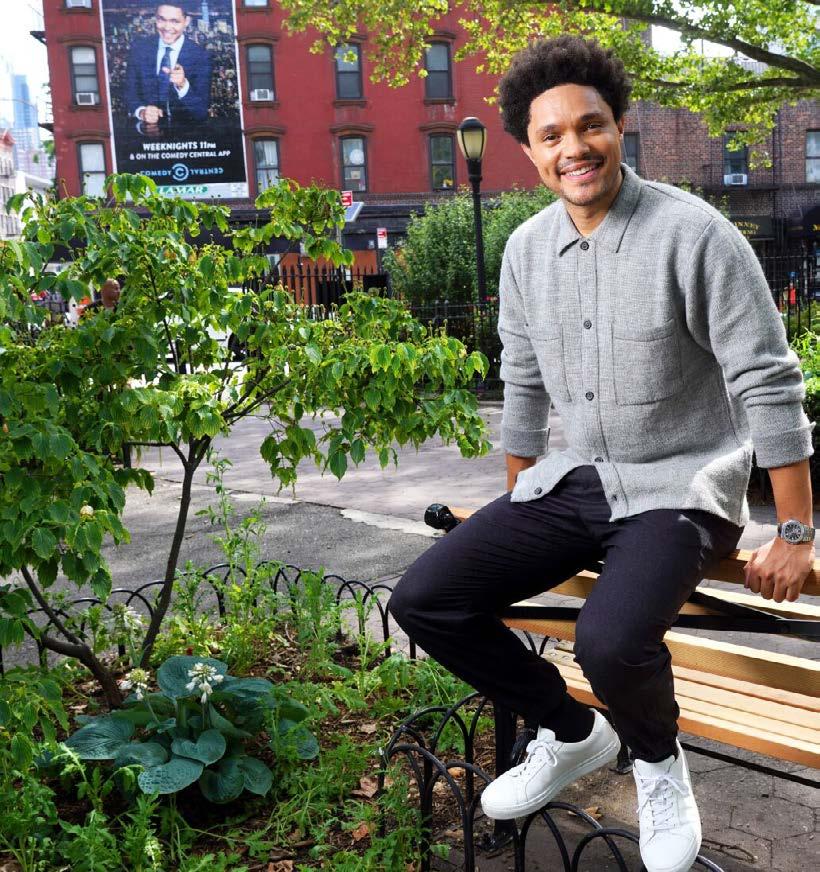 By Allaina Kilby
By Allaina Kilby
A frica’s most famous funny man and TV star, the South African stand-up comedian and author Trevor Noah, is leaving his job as the host of Comedy Central’s The Daily Show in the US. Noah, who hosted the high profile show for seven years, says he wants to devote more time to his stand-up career.
We asked Allaina Kilby, a journalism, political communication and satire lecturer, how he will be remembered in the political satire landscape on TV in the US.
Taking over from Jon Stewart was never going to be easy. Stewart was widely respected for his passionate satirical take downs of US political transgressions and cable news channels. The appeal of successful satirists like him is that they are on the audiences’ side, they articulate citizen concerns and anger on a public stage but in a funny and compelling way. This creates a bond between the satirist and audience and this is why Stewart leaving The Daily Show was such a big deal to his loyal followers. Noah, a little known comedian back in 2015, had to build that trust back up with an audience who had no idea who he was. This took some time and viewing figures for the programme took a dip in the first two years. But even tually the audience came to realise that Noah was equally as capable as Stewart if not more so because he was able to offer something different to his predecessor: an outsider’s perspective to America’s politi cal and social problems.
The American late-night comedy scene is very male, white, and American. As a native South African, Noah has brought clarity and fresh perspectives to emotionally charged political issues that
are often missing from latenight comedy and American cable news.
But growing up as mixedrace during apartheid also enabled Noah to handle crucial moments like the Black Lives Matter movement with a level of awareness and sensitivity that could never be matched by his white, male counter parts. These unique perspec tives caught the attention of a younger and more diverse global audience that have been introduced to The Daily Show via Noah.
The genre has become a highly saturated space with lots of different programmes vying for the attention of audiences who are leaving TV in favour of digital platforms. This makes it increasingly difficult for the more progressive and political ly charged satire programmes to have the same impact they once had, particularly when the highest rating shows in the genre tend to be more enter tainment focused like Jimmy Kimmel Live and The Late Late Show With James Corden
It is vital that TV satire shows continue to highlight and critique political and social issues. However, it is equally important that they explore them through the lenses of gender, race and class and via a wider variety of digital platforms.
Trevor Noah’s tenure on The Daily Show has highlighted the importance of challenging the white, male centric nature of the American late-night scene. I hope that the show continues to recognise the importance of diversity. Maybe this time they can bring American actresses and comedians Jessica Wil liams and Samantha Bee back into the fold as chief anchors.
There is an urgent need to tackle men’s issues more than ever be fore; because men and boys are vulnerable to crime and tend to be in the majority with regards to being vic tims of death from unnatural causes. This is the view expressed by Dr Linda NcubeNkomo, Love Life CEO.
In an interview with The Telegram, Dr Ncube-Nkomo said: “When you look at local and global statics of violence holisti cally, men are not only the major perpetra tors of crimes but are also victims. Equally, statistics for suicide show that the majority of deaths by suicide are of teenage boys and men under the age of 35.
“These issues point to the deep-rooted problem that is not being addressed. Instead, we are focusing on the symp toms as shown by behaviour and not the causes.”
Statistics, according to Dr NcubeNkomo, are a revelation that men all over the world are under siege. She argues that this is largely because societies have normalised harmful behaviours which are used to define manhood.
Violence, suppression of emotions, promiscuity, among others, are encour aged in boys and “we get surprised when men are violent and struggle to express their emotions. We have created volca noes and should expect them to erupt at some point”.
Dr Ncube-Nkomo also stated that issues distressing men also affect boys: “Long before men are men, they are boys. They are exhibiting, as men, what they experienced as boys. The first school that they go to is their home. If the homes in
which they are raised have abusive adults, the result will be that they see abuse as a normal way of life.
“If they are raised in homes in which values of respect, dignity, love, honesty, accountability and so on are espoused, then they will be men who uphold those standards.”
“I have already mentioned, it starts in the home and the community in which a child is raised. We need to encourage boys to talk about their feelings, their joy and pain, concerns and help them learn healthy ways of dealing with conflict.”
She adds there is a need to create safe spaces for men to be vulnerable and it is men themselves who need to create those spaces. “If you think about it, women have for generations created safe spaces for themselves and didn’t wait for men to do it for them. Men need to acknowledge that they need help and ask for it.”
Men need to be each other’s keepers.
“I don’t mean this in a way that says they protect each other and adhere to some code when the safety of other people is involved. They need to call out rapists and abusers and not protect them in the name of creating safe spaces. Men need to encourage each other to ask for help and not watch one of their own selfdestruct and destroy the lives of others,” Ncube-Nkomo explained.

“Boys are raised mostly by women and they (women) too need to play their part in solving the issues that have made com munities unsafe.” Paraphrasing Frederick Douglas, she added: “it is easier to raise
strong men than to mend broken men.”
She said when women start to be the advocates for safe spaces for boys; soci ety is more likely to listen. Some women are unfortunately the gate keepers of harmful patriarchal practices and “we all need to unlearn the toxic behaviours and methods that have for so long been part of how we live”.
“I think the local traditional structures that exist across South African society would be a more effective way of getting men to teach young boys the values as part of the rite of passage into manhood. Since Men’s forum started, have they been visible, what have they been doing and what has been their impact?”
Asked about the efficacy of facilitat ing dialogues between men’s forums and women’s groups, Dr Ncube-Nkomo said: “The question I would ask would be to what end. What would we want to achieve from the dialogues in the first place? Would it be another talking session or would we come away from the engage ments having listened and heard each other?”
“Most importantly, such gatherings must be able to define what needs to be done to correct the way things have been done. These dialogues would need a level of maturity that allows each individual to express their pain and take responsibil ity for the pain they have caused across gender.
“But, if these dialogues end up as platforms for apportioning blame and jus tifying why certain behaviours are done, then I don’t think we would get value from them.”
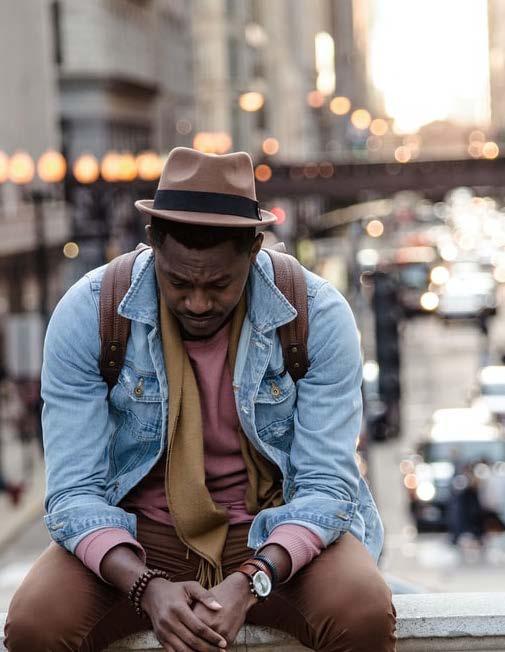
Just because I am a man, it does not mean she cannot hurt me. I am human too…but nobody believes me.
Lauren Jacobs a researcher, social justice journalist and author says domestic violence is a major social cruelty within South Africa, while we annually discuss and rally support for the 16 Days of Activ ism against Gender Based violence, many forget that domestic violence is a daily, ongoing struggle…
Asa researcher, I spent years inter viewing, questioning, turning over statistics and policies in order to understand the extent and impact of domestic violence. My research opened up painful cruelties in terms of what women suffer at the hands of the men who claim to love them and yet another face of domestic violence suddenly began to form before my eyes.
While domestic violence has always focussed on advocating women’s rights in
terms of abuse, our society has in recent years, seen a rapid increase in domestic violence against men. Worldwide statistics indicate that as many as one in three victims of abuse are in fact males and the stigma attached to this reality prevents many men from speaking out.
Men across differing social communi ties are often taught to be in control, less emotional, stronger and more tolerant of mistreatment by their wives. But the Domes tic Violence Act of 1998 protects all victims of domestic violence, without making it an issue of gender.
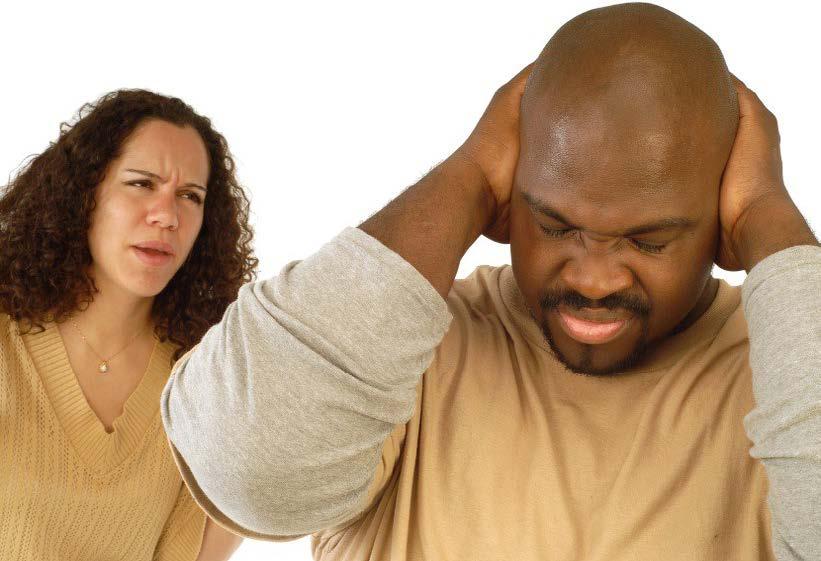
A domestic relationship exists between a complainant and a respondent in one of the following ways; they are or were married to each other, they live or lived together in a relationship or in the nature of mar riage. They are the parents of a child or are
persons who have or had parental respon sibility for that child, they are family mem bers, they are or were in an engagement, dating or customary relationship including an actual or perceived romantic, intimate or sexual relationship or they share or recently shared the same residence.
Domestic violence means, physical abuse, sexual abuse, emotional, verbal or psychological abuse, economic abuse, in timidation, harassment, stalking, damage to property, entry into the complainant’s house without consent, where the parties do not share the same residence or any other controlling or abusive behaviour towards a complainant, where such conduct harms or causes imminent harm to the safety, health or wellbeing of the complainant.
In an interview with a warrant officer at a local Cape Town police station, I addressed the issue of domestic violence and how it impacts the lives of men.
The warrant officer understood the issue well and shared the following: “Men often
come in to the police station to ask about their rights in terms of domestic violence. Their shoulders are slumped and the scars are visible both physically and emotionally.
“They are often slapped, punched, have nail marks or bite marks on their skin but they rarely lay an assault charge or leave their marriages. Most of the time, they are too ashamed and wonder what others are going to think of them if they admit to being abused.”
Yet, if you are a man and your wife frequently hits or slaps you, punches you, throws the car keys or dishes, or any other moveable objects at you, or if she belittles you in public, then you are being abused. If she threatens you, withholds your money, is possessive, makes false accusations about you, controls who you see and where you go or threatens to take your children away if you report the abuse, then you are being abused.
Dr Tara from shrink4men.com said: “Women-centric domestic violence groups and Dr Phil would like our society to believe that only men can abuse and only women can be victims. They are lying to you.
“In fact, individuals who perpetuate this lie are abusers themselves. Why? Because
not only are they denying help to millions of men and their children suffering, every day, they’re denying the existence of their suffering.”
There are many reasons why millions of abused men stay in relationships and mar riages of abuse, the reasons include shame, humiliation, and the doubt that others will believe their stories. Some faith groups advocate that divorce is a sin and deserves punishment, or a man desires to protect his children or fears he will never see his children again if he reports the abuse.
In some cases I have encountered personally, the wives have ownership of a gun and threaten to find the husband and to kill him if he leaves or gets involved with someone else after divorce.
However, every single individual that lives today is valuable and every life is pre cious.
No matter who you are, you are worth a life of value and love. Only you hold the keys to a better life, a life of freedom, break ing free of abuse is never easy and the road is winding but time is a great healer.
If you are looking for advice and help on how to break out of the cycle of abuse you are currently facing as a husband, then get
advice from a domestic violence website or support group, or counsellor. Contact a local organisation.
Document and get evidence of the abuse, report it to the police, keep impor tant documents like passports etc. on hand, in case of severe life – threatening situa tions where you need to leave your home with your children.
Do not retaliate with force or abuse, abusers can be manipulative or antagonis ing, do not retaliate with violence, this will only be a tool for her to abuse you further.
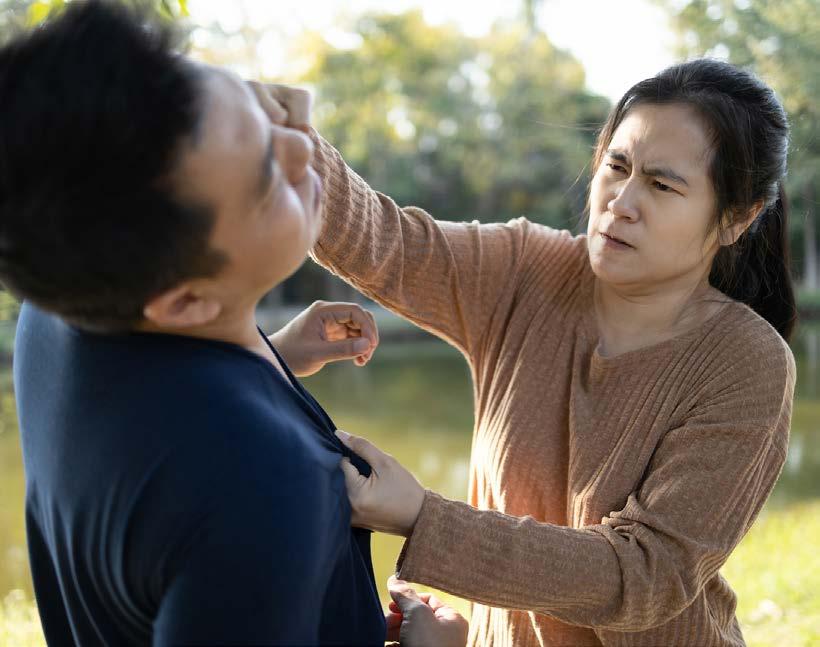
The police have to protect you accord ing to our constitution and they have to treat you with dignity and respect, care and concern.
Above all else, you can be free of this cycle of violence, society has a double stan dard yardstick when it comes to facing the reality of male abuse, yet there are those who will walk with you and who will believe you. I pray for success in your journey and the ability to see that you are valuable and worthy!
The courage to break free may seem like a big step but once you break free, you become a survivor one small step at a time. – spice4life.co.za
When Zethembe lost his job during the national lockdown he started growing veggies that he sells to the villagers in Umkhomazi.
Photo
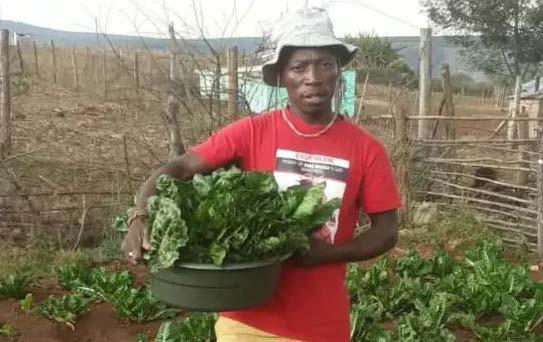 BY VATEKA HALILE
BY VATEKA HALILE
Zethembe Shezi still remembers the day he decided to plant spinach in his father’s garden. He was just 11 and got the scolding of his life from his mother who thought he was wasting seeds. Lucky for him, that spinach grew and was enjoyed by his family and shared with his neighbours.
“As a boy growing up in the vil lage, playing with the soil was part of the games we played as kids,” said Zethembe. He says there are many creative things to be done with the soil. Growing up, he and his friends loved working. While playing, they would mould towers, homes and bridges made from the mud. This led Zethembe to grow food.
“At the time, I just loved the beauty of plants, not realising that they had such great value to human nutrition and the country’s economy.”
Zethembe was born in Ixopo, in the vil lage of Umkhomazi, KwaZulu-Natal.
He says he wanted to become a teacher, but financial circumstances at home did not allow this, so he worked in various supermarkets after matric.
“During the first Covid-19 lockdown, I
was retrenched from my job as a mer chandiser.”
He returned to his home in Ixopo and that is when the idea to grow food came to life.
“I bought spinach seeds and put them in the ground, like I used to do. I watered them at least twice a day, in the morning and in the afternoon.”
Zethembe sells his produce to local stores and villagers. “I deliver twice as much now as I used to because my pro duce sells like hot cakes.”
With climate change and water scarcity in South Africa, Zethembe says it is even worse in Ixopo. He travels three kilome tres to collect water using a wheelbar row.
“The only time I rest is when it rains,” he says.
Another challenge Zethembe has to face since he started his business, is pests that wreak havoc in his garden. To mitigate this, Zethembe has sought advice from farmers in the area.
“My mother and other farmers advised me to create scarecrows. That worked brilliantly, but only for a while. Birds came back and the scarecrows did not work – until I figured out on my own that I needed to change the colour of the clothes and the location of the scare
crows. I did that, and it works well.”
He believes the KwaZulu-Natal weath er is what attracts pests to his garden.
“To get rid of the insects, I use a coffee mixture – thanks to social media farming groups for this tip. It is a mixture of coffee and water that I spray early in the morning before the sun comes up and it has worked well.”
Food gardens can unlock endless pos sibilities for the unemployed youth, says Zethembe.
“The most important thing about being your own boss is coming to terms with the fact that your plans are in your own hands. Even if they are good, it is up to you how you implement them. That allows you to focus and make good deci sions.”
Zethembe produces cabbage and spinach and says these veggies require less maintenance and can be grown all-year round. Spinach and cabbage are in demand in his community and are a staple diet as they are affordable greens.
“One of the things in the pipeline is irrigation and livestock. I see my busi ness trading internationally one day, and I believe everything starts somewhere.”
Zethembe’s plan is to approach local supermarkets, but transportation and a lack of space are some of his challenges. – foodformzansi.co.za
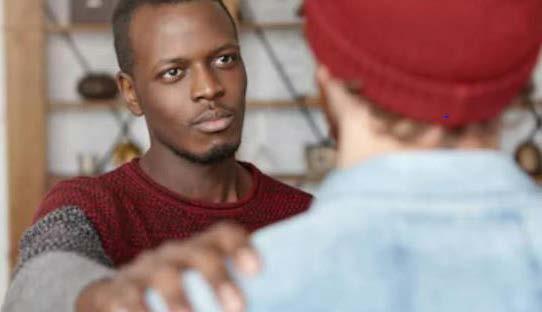
What does it mean to hold yourself accountable for your behaviour?
Is it simply admitting to wrongdoing or can it be the catalyst for change?
Randy Flood, host of the Revealing Men podcast, psychotherapist, and Direc tor of the Men’s Resource Centre of West Michigan in the US, takes a look at how ac countability can become the foundation for change in men who struggle with abusive/ controlling behaviours and addictions.
Al Heystek and Otha Brown are principal therapists at the Men’s Resource Centre and provide counselling for domestic abuse and anger management as well as treat ment for sex addiction and problems with pornography. Some of the clients they see are referrals from the court system or from intimate partners making strong ultimatums.
Heystek explains: “We talk about proba tion officers, and partners, and others … they want men to get accountable and be empathic.”
And even though clients express re morse for what they have done, many do not know how to move beyond that.
Brown says, “Men come into our service feeling a lot of shame. They’ve felt really bad about what they did. And yet, they miss the impact of their behaviour on their part ner. They’re saying ‘I’ve taken responsibility’ but they don’t really understand the impact of their behaviour.”
Brown and Heystek reveal how the process of learning to be accountable takes their clients on a journey of self-discovery and healing. While active denial, blame, and minimisation are barriers to accountability, they compassionately explain how those defences are ultimately in the service of avoiding the searing pain of shame and guilt for hurting the people they love.
Many of the men they see rationalise their behaviour based on how they were brought
up.
“Guys will talk about what they did,” says Brown, “and then soon after they’re talking about their experience as a kid. How they were raised; the behaviour of a parent or father figure and in some ways, thinking that this was helpful for them. Rationalis ing what they did in their relationship. It’s a story of being treated violently, abusively, and no one there to explain ‘hey, that’s wrong’ and ‘there are better ways to teach this lesson’.”
Flood observes: “Men who were abused can grow up thinking they deserved it. Or that’s the way you make better men, by punishing them or shaming them.” He notes that these long-held ideas - coupled with socialisation - can be barriers to change.
“If they can’t have compassion for what happened to them, then that’s a barrier for them having compassion for others.”
He quotes noted author and feminist, Bell Hooks: “The first act of violence that patri archy demands of males is not violence toward
women. Instead, patriarchy demands of all males that they engage in acts of psychic self-mutilation, that they kill off the emotional parts of themselves. If an individual is not successful in emotionally crippling himself, he can count on other patriarchal men to enact rituals of power that will assault his self-esteem.”
Flood notes that accountability becomes the foundation for change because, “If you’re not accountable, you’re not able to talk about yourself. You’re not able to talk about what’s going on with you.”
A person who is not self-aware will have a difficult time being held accountable, let alone be open to change. Brown talks to his clients about the importance of being vulnerable, transparent.
He says, “Without vulnerability, there can be no connection. This is the problem in a lot of relationships. Men come in, and for better or worse, sort of objectifying their partner. And not really making a connection on a feeling level. They start fighting; argu ing and using power strategies because they fail to be vulnerable and make connec tions with their partner.”
Being vulnerable might also mean let ting go of control says Heystek: “Accessing that vulnerability…. and not getting into the adrenaline of being angry, or frustrated, or defensive. The enemy of accountability isn’t just those emotions (because those emo tions are in the service of trying to stay in control). If I have that adrenaline going then I’m trying to manage or control the conver sation.”
To get to a point of vulnerability - and, Flood adds, humility - Brown and Heystek’s clients
need to access and talk about their feelings.
Brown explains it is not that easy: “It’s the way we’ve been socialised and raised. ‘If I start talking about my feelings, then I’m no longer masculine. …That’s soft. I don’t want to be soft.’…It’s such a threat for men who believe their masculinity is absolved of feelings.”
This is when the support and example of other men come into play. Although both Brown and Heystek offer one-on-one counselling and therapy, it is when clients participate in men’s support groups that they have seen remarkable change.

Heystek says: “we try to create an ex perience for men where they can, in a safe place, look at what they did, be account able for it, and also to experience empathy. From us. Not condoning their behaviour. But to go ‘hey, we’re all humans. We all make mistakes.’ And the power of the group, of course, is that you’re not less than, you are not better than, you’re just one of the guys.”
It is not about measuring on a hierar chy of how bad someone is by how they behave. It is just seeing the inner struggle that contributes to the behaviour that they all have in common.
Brown and Heystek talk about how their clients open up in men’s support groups in remarkable ways.
Brown says, “Sometimes I get people who say ‘I won’t talk in groups.’ And, I say, well, give it a shot and we’ll see what you think. …And, you know, after a couple of times (and I’ve just seen it over and over) guys are coming in and they’re baring their souls. They’re talking like they were group participants for years. This is an opportunity
for a man to be different.
“He thinks of himself as ‘I don’t talk in groups’ but he gets there and he hears comments of other men and other men mentioning their feelings and their experi ences and he comes out and he’s different. …When we give guys a chance to be human with each other, they take it.
“They stop the one-up-men-ship, they stop the put-downs, they stop the embar rassment, and they begin to open up and be for real. I’m amazed when it happens but it happens in groups and guys get it.”
Heystek adds, “I think that’s how men learn humility…from being in a community. Being with other people. You don’t learn hu mility by reading a book. You’re with other people and you deal with those feelings… of shame, “I’m worse than” or arrogance, “I’m better than” - the group experience provides a chance to deal with both of those kinds of feelings and come to another place where ‘You know what? I’m just one of the human beings in here.’ And when [men] get to that place, then [they] can be more accountable and empathic.”
Heystek describes how he sees the tie between accountability and change: “I can own what I did.
I can own the feelings that I have about it. I can connect the dots between what I did and how that affected my partner or somebody else or maybe my child and have conversations about that without getting upset and defensive. Because I know that I don’t have to identify with those bad things that I did. I can own that I did those things but that doesn’t mean that I’m this bad guy.” – menscenter.org

Strength, courage, mastery, empathy and honour are the alpha virtues of a gentleman. Boys become men of integrity through the influence of people who care about the boy child… and intentionally creating a positive and nurturing environment!
